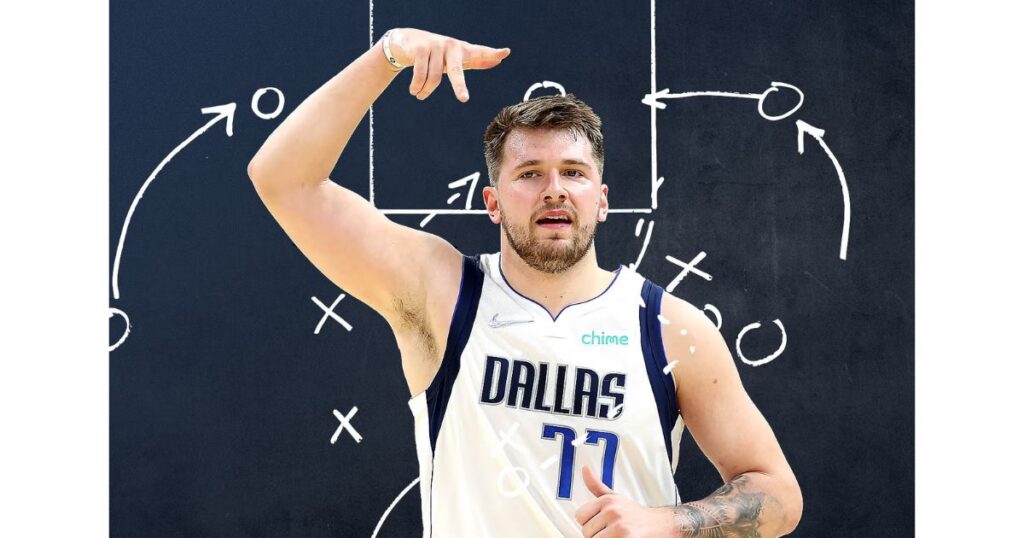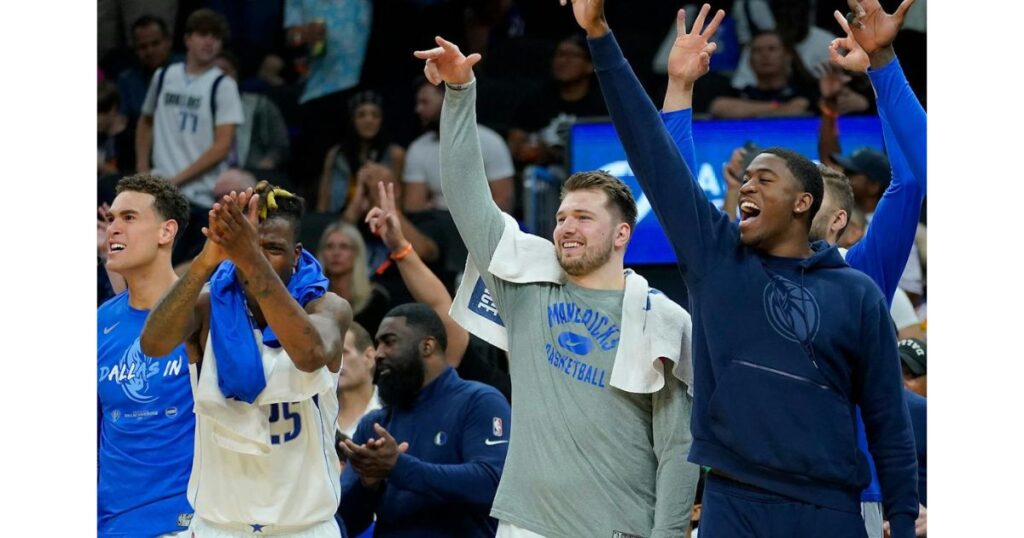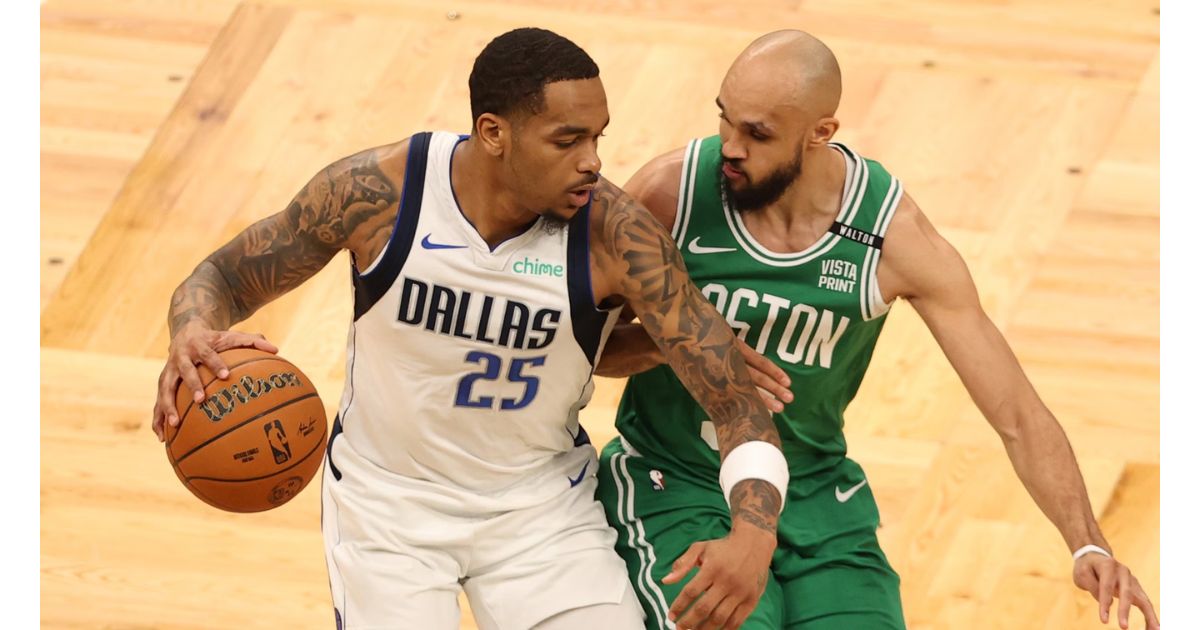The Boston Celtics vs Dallas Mavericks faced off in an exciting NBA matchup. Star players from both teams showed their skills on the court. This game highlighted the talents of Jayson Tatum, Jaylen Brown, Luka Dončić, and others. Their performances shaped the outcome and thrilled fans.
Player stats tell the story of the game. They reveal who scored the most points, grabbed the most rebounds, and made the best plays. These numbers help us understand each player’s impact. They also show how team strategies worked out on the court. This article will explore key stats from this Celtics-Mavericks showdown.
Jayson Tatum’s Scoring Prowess

- Jayson Tatum led the Celtics with 28 points in this game.
- He shot 48% from the field
- 37% from three-point range.
- Tatum also grabbed 7 rebounds and dished out 5 assists.
His scoring came from both inside the paint and beyond the arc. Tatum’s performance showed why he’s a key player for the Celtics. He created shots for himself and his teammates.
His ability to score from different areas of the court kept the Mavericks’ defense guessing. Tatum’s all-around game helped the Celtics stay competitive throughout the match.
Read This Article: Denver Nuggets vs Lakers Match Player Stats A Detailed Analysis
Jaylen Brown’s Defensive and Offensive Balance

- Jaylen Brown contributed 24 points to the Celtics’ effort.
- He shot 46% from the field.
- 35% from three-point range.
- Brown also added 6 rebounds, 4 assists, and a steal to his stat line.
His performance showed his value on both ends of the court. Brown’s scoring helped take pressure off Tatum. His defensive efforts disrupted the Mavericks’ offense.
Brown’s ability to impact the game in multiple ways made him a standout player. His balanced play exemplifies the Celtics’ team-first approach.
Luka Dončić: The Mavericks’ Offensive Dynamo

- Luka Dončić dominated for the Mavericks with 32 points.
- He shot an impressive 50% from the field and 40% from three-point range.
- Dončić nearly had a triple-double, adding 9 rebounds and 10 assists.
He also contributed on defense with steals and blocks. Dončić’s performance showcased his role as the Mavericks’ primary playmaker. He created scoring opportunities for himself and his teammates.
His ability to score from anywhere on the court kept the Celtics’ defense on their toes. Dončić’s all-around game proves why he’s considered one of the NBA’s top players.
Dwight Powell’s Role in the Mavericks’ Frontcourt

- Dwight Powell scored 12 points and grabbed 8 rebounds for the Mavericks.
- He shot efficiently, making 60% of his field goal attempts.
- Powell also contributed on defense with 2 blocks and a steal.
His presence in the paint gave the Mavericks a solid interior option. Powell’s performance highlighted his importance to the Mavericks’ frontcourt.
He provided reliable scoring near the basket. His rebounding helped the Mavericks control the glass. Powell’s defensive efforts protected the rim and disrupted the Celtics’ inside game.
Marcus Smart’s Defensive Influence on the Game
Marcus Smart’s impact on the game went beyond the standard box score. He focused on disrupting the Mavericks’ offense with his tenacious defense. Smart’s ability to create turnovers and pressure ball handlers made life difficult for the Mavericks’ guards.
Smart’s defensive prowess allowed the Celtics to maintain their defensive intensity. He helped contain Dončić when matched up against him. Smart’s occasional scoring bursts provided a boost to the Celtics’ offense. His leadership on the court energized his teammates throughout the game.
Read This Article: Busta Rhymes Wife: The Truth About His Unmarried Status
The Role of Bench Players in Shaping the Outcome
Bench players from both teams made important contributions. They provided rest for the starters without a significant drop in performance. Key reserves scored crucial points, grabbed important rebounds, and played solid defense.
Their efforts helped maintain team momentum during crucial stretches. The bench players’ impact shows the depth of both the Celtics and Mavericks. Their ability to step up when called upon proved vital in this closely contested game.
The performance of these role players often makes the difference in tight matches. Their contributions highlight the importance of a strong, well-rounded team in the NBA.
Comparing Team Strategies and Their Effectiveness
The Celtics and Mavericks used different game plans. The Celtics focused on balanced scoring and tough defense. They spread the ball around and tried to stop Luka Dončić. The Mavericks built their offense around Dončić’s skills.
They wanted him to create shots for himself and his teammates. Both strategies had pros and cons. The Celtics’ balanced approach kept the Mavericks guessing. But it sometimes lacked a go-to scorer in clutch moments.
The Mavericks’ Dončić-centric plan led to high scoring. It made them predictable at times. The team that adjusted better during the game gained an edge.
The Impact of Turnovers on Game Flow
Turnovers changed the game’s momentum. Each time a team lost the ball, it gave their opponent a chance to score. The Celtics aimed to limit their turnovers and capitalize on Mavericks’ mistakes. The Mavericks tried to pressure the Celtics into errors and score off them.
Smart plays and ball security became crucial. Teams that protected the ball kept their offensive rhythm. They also prevented easy baskets for their opponents. Turnovers often led to fast breaks and quick points. This swung the energy and scoreboard in favor of the team, forcing turnovers.
Free Throw Performance and Its Influence
Free throws played a big role in the final score. Players who made their free throws helped their team stay in the game. Those who missed cost their team easy points. The Celtics and Mavericks both sent players to the line throughout the match.
In close games, free throws can decide the winner. Players who shot well from the line became more valuable. Coaches often choose who to foul based on free throw percentages. Teams with better free-throw shooters had an advantage in tight situations.
Assessing the Impact of Injuries and Rest
Injuries and rest affected both teams’ lineups. Some players couldn’t play their usual minutes. Others had to step up and fill in. The Celtics and Mavericks had to adjust their game plans based on who was available.
The rest also played a part in the players’ performance. Players who had more rest often showed more energy on the court. Teams had to balance playing their best players with keeping them fresh. How each team managed injuries and rest influenced their overall performance.
Player Matchups and Their Significance
Key matchups shaped the game’s flow. Jayson Tatum vs. the Mavericks’ defenders was a crucial battle. So was Luka Dončić against the Celtics’ defensive schemes. These individual contests often determined scoring runs and momentum shifts.
Coaches tried to create favorable matchups for their stars. They also looked to exploit weaknesses in the opponent’s lineup. Players who won their matchups gave their team an edge. The team that managed these battles better often came out on top.
Analyzing the Impact of Coaching Decisions
Coaches made important choices throughout the game. They decided on starting lineups, substitutions, and tactical adjustments. The Celtics’ coach focused on defensive switches to contain Dončić. The Mavericks’ coach looked for ways to free up Dončić and create mismatches.
Timeout calls and late-game strategies also mattered. Coaches had to decide when to challenge calls and how to use their bench. Their ability to read the game and make smart choices affected the outcome. The coach who made better in-game adjustments gave their team a significant advantage.
The Influence of Recent Performance Trends
Recent performance trends play a key role in understanding how players approach important matchups like the one between the Boston Celtics and Dallas Mavericks. Players often build momentum or face challenges based on their recent games.
For example, if Jayson Tatum has been scoring efficiently in the last few games, he will likely carry that confidence into this matchup. If Luka Dončić has been struggling with his shooting, the Mavericks might adjust their strategy to help him find better shots.
These trends help coaches make decisions on rotations and game plans. Tracking these trends gives fans and analysts a clearer picture of how each player might perform. For instance, a player who has been rebounding well in recent games might continue to dominate the boards.
Evaluating the Impact of Fan Engagement and Morale

Fan engagement has a powerful impact on how players perform, especially in tight games like Celtics vs. Mavericks. The energy from the crowd can boost a player’s morale, pushing them to play harder. Home-court advantage often shows how much fans can influence the outcome.
A roaring Boston crowd can elevate the Celtics, making it tough for the Mavericks to stay focused. On the flip side, when Mavericks fans get loud, their team might find extra gear, particularly in critical moments.
Morale plays an equally important role in player performance. If a team feels confident and united, their play reflects that. The Celtics may play better when they are on a winning streak and feeling good about their chances.
If the Mavericks have recently lost a few games, they might struggle with confidence, which would affect their execution on the court. Evaluating these factors helps explain why some teams perform better than expected in certain situations.
The Effect of Referee Decisions on Player Performance
Referee decisions can have a significant impact on player performance during a game. A few quick fouls on a key player like Luka Dončić can disrupt the Mavericks’ entire game plan.
If Dončić has to sit due to foul trouble, it can throw the team’s rhythm off, affecting their offensive flow. Similarly, a questionable call against Jayson Tatum can spark frustration, leading to a drop in focus or even more fouls.
On the other hand, fair and consistent officiating allows players to play their natural game without fear. When players feel that the referees are calling the game evenly, they tend to play with more confidence.
If players perceive bias or inconsistency, it can lead to hesitation, mistakes, or even confrontation. The impact of these decisions extends beyond just the individual player. It influences the overall flow and outcome of the game, making refereeing a crucial element in any matchup.
The Role of Team Chemistry and Communication
Team chemistry and communication are crucial in basketball. The Boston Celtics rely on strong teamwork to execute their game plan. Players like Jayson Tatum and Marcus Smart have developed a deep understanding of each other’s playstyles.
This connection allows them to anticipate each other’s movements, leading to efficient plays. Effective communication on the court ensures sharp defensive rotations and well-coordinated offense. The Dallas Mavericks also emphasize the importance of chemistry.
Luka Dončić, as the team’s leader, constantly communicates with his teammates to keep everyone on the same page. This is vital in high-pressure situations where one mistake can change the game. Effective communication helps the Mavericks manage turnovers and execute their strategy.
Analyzing the Impact of Game Pace and Tempo
The pace of the game has a big impact on player performance. The Boston Celtics often control the tempo by slowing down the game and focusing on half-court sets. This strategy minimizes mistakes and allows players like Jaylen Brown to exploit defensive mismatches.
Controlling the tempo also helps the Celtics set up their defense effectively. A slower pace benefits the Celtics by reducing fast-break opportunities for the opposition. The Dallas Mavericks prefer a faster pace, with Luka Dončić pushing the ball and creating quick scoring opportunities.
A faster tempo puts pressure on the Celtics’ defense and forces them to make quick decisions. When the Mavericks control the pace, it often leads to easy baskets and momentum shifts. If they lose control of the tempo, it can disrupt their rhythm.
Read This Article: Shaq Net Worth 2024: Discover the Basketball Legend’s Wealth
The Significance of Bench Depth and Rotation
Bench depth is critical for a team’s success. The Boston Celtics benefit from a strong bench that maintains performance when starters rest. Players coming off the bench provide fresh energy and can change the game’s course. Effective rotation ensures that starters are rested for crucial moments.
A deep bench gives the Celtics a competitive edge, especially in long, grueling games. For the Dallas Mavericks, bench depth is equally important. The team relies on its bench to support Luka Dončić and other starters when they are off the court.
A strong rotation keeps the team’s energy levels high and allows them to match up better against opponents like the Celtics. Bench players who can score, defend, and contribute in various ways are invaluable. When the Mavericks’ bench performs well, it creates a balanced attack and reduces pressure on starters.
The Future Implications of Player Performance
Player performance in key matchups has lasting effects. For the Boston Celtics, strong showings by players like Jayson Tatum and Jaylen Brown build confidence and set a positive tone for future games. Success in high-pressure situations can lead to better playoff positioning.
Good performances against tough opponents like the Mavericks strengthen the team’s belief in their ability to compete. This also attracts positive attention, leading to more individual recognition and growth. The Dallas Mavericks also see long-term benefits from standout performances.
Luka Dončić’s ability to dominate games boosts team morale and sets a standard for his teammates. Consistent performances help the Mavericks develop a winning culture. This success can influence future games and impact team building in the offseason. High-level performances reinforce the team’s strategies and shape the trajectory of their season.
Conclusion
The Boston Celtics vs Dallas Mavericks matchup showcased exceptional talent and strategic gameplay. Key performances from Jayson Tatum, Jaylen Brown, and Luka Dončić highlighted the game’s intensity.
The clash of strategies, individual brilliance, and team efforts provided an exhilarating experience for fans. It emphasized the importance of well-rounded team dynamics in securing victories. As both teams look ahead, the insights gained from this game will undoubtedly influence their future performances and strategies.
FAQs
Who is the best player on the Mavericks right now?
Luka Dončić is currently the best player on the Dallas Mavericks, known for his exceptional scoring, playmaking, and leadership.
Who is the greatest player in the Dallas Mavericks?
Dirk Nowitzki is widely considered the greatest player in Dallas Mavericks history, known for leading the team to its first NBA Championship in 2011.
What are the odds for Mavs vs Celtics?
The odds for a Mavericks vs. Celtics game vary depending on recent performance, injuries, and betting markets, so check a reliable sportsbook for the latest odds.
Who won the finals MVP for the Mavericks vs Celtics?
Jaylen Brown won the 2024 NBA Finals MVP after leading the Celtics to victory.










